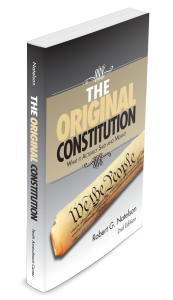The Constitution says that the president “shall be Commander in Chief of the Army . . . of the United States.”
Does that give him authority to utilize our armed forces for a purely non-military purpose like addressing the Ebola outbreak in Africa?
The Denver Post thinks so, editorializing that Obama’s decision is “fully justified.”But the Post doesn’t tackle the constitutional issues.
The Ebola mission, according to the Associated Press, is “to supply medical and logistical support to overwhelmed local health care systems and to boost the number of beds needed to isolate and treat victims of the epidemic.” Our troops will be doing things like handing out home health kits to Africans and building health clinics.
Note that this is different from the armed forces carrying on humanitarian actions as an incident to military operations. When you are fighting an enemy abroad, it makes sense to build hospitals to retain local good will or to care for those injured a result of war.
But we are not engaged in military operations in Africa.
So what does the Constitution have to say?
The Constitution contains no clause specifically prohibiting the president from using the armed forces this way. You might think that such a limit would be inherent in the Constitution’s use of the word “Army.” That is, you might think the word “Army” would be limited to an exclusively military organization. But founding-era dictionaries do not impose that restriction on the term “Army.” As those dictionaries define the word, an “Army” is merely a large number of armed men subject to central leadership. (This, by the way, is one reason the U.S. Air Force is constitutional, even though the Constitution doesn’t refer to it. The Air Force fits within the constitutional meaning of “Army.” Indeed, it was originally the Army Air Service and later the Army Air Corps.)
The operations in Africa sound noble. But the old legal saying is: Hard cases make bad law. In other words, yielding to an innocent-sounding usurpation may create a dangerous precedent. So ask yourself: Does the Constitution allow the president to use the “Army” for any non-military purpose he pleases?
Or maybe you prefer to focus on some narrower examples:
* If the president decides that Argentina does not have sufficient health facilities, may he constitutionally send in the army to open and staff clinics there? (He could take the needed funds from Department of Defense appropriations.)
* Could he make the same decision for Pennsylvania?
* Could he send the army to register voters when there is no accompanying military threat?
* If your answer to the last question is “yes,” then could he focus the army’s registration campaign in states that lean toward his own party? If not, how does this differ constitutionally from the previous example?
* Could he send the military to build a highway in Ohio, if he concluded the highway was necessary for the economy there? Suppose his decision was related to Ohio’s vote in the next election?*
If those examples make you nervous, then your gut is telling you something. The army is not the president’s personal plaything. It is not a generalized work crew the president can order to do whatever he wants done. It is a military instrument, and it is dangerous to allow the president to use it for other purposes.
My guess is that the Constitution does not contain a clause banning the president from using the army for non-military ends only because the framers never imagined that any American president would do so.
Yet it has happened, and it demonstrates a flaw in our political system. For all its strengths, our Constitution contains inadequate protection against a president determined to ignore conventional limits. We have seen this before.
For example, it occurred in World War II, when the president shot at least one American citizen within the continental U.S. without a civilian trial and without habeas corpus, and when he imprisoned tens of thousands of others. (The U.S. Supreme Court failed to stop either action.) We now recognize that these were impermissible constitutional violations, but our repentance didn’t come in time to save the victims.
Once again we are witnessing the exercise of arbitrary executive power—and this time, the president does not even have the excuse of a war. But without a constitutional amendment, we are probably powerless to stop it.
- The Truth about the Much-Abused Commerce Clause - February 28, 2024
- The Meaning of “Regulate Commerce” to the Constitution’s Ratifiers: An Update - February 7, 2024
- Why It May be Impossible to Disqualify Trump from the Presidency - January 8, 2024

